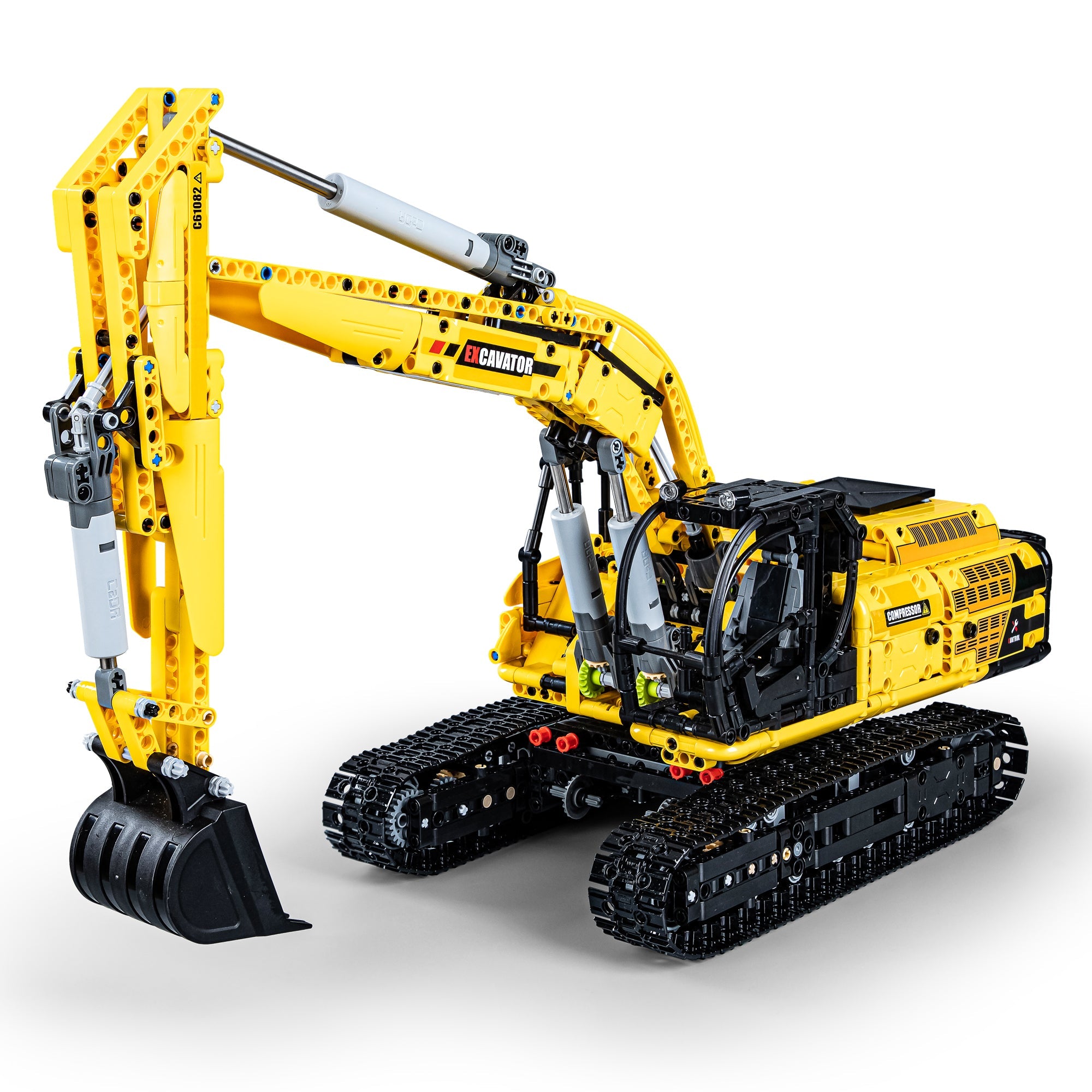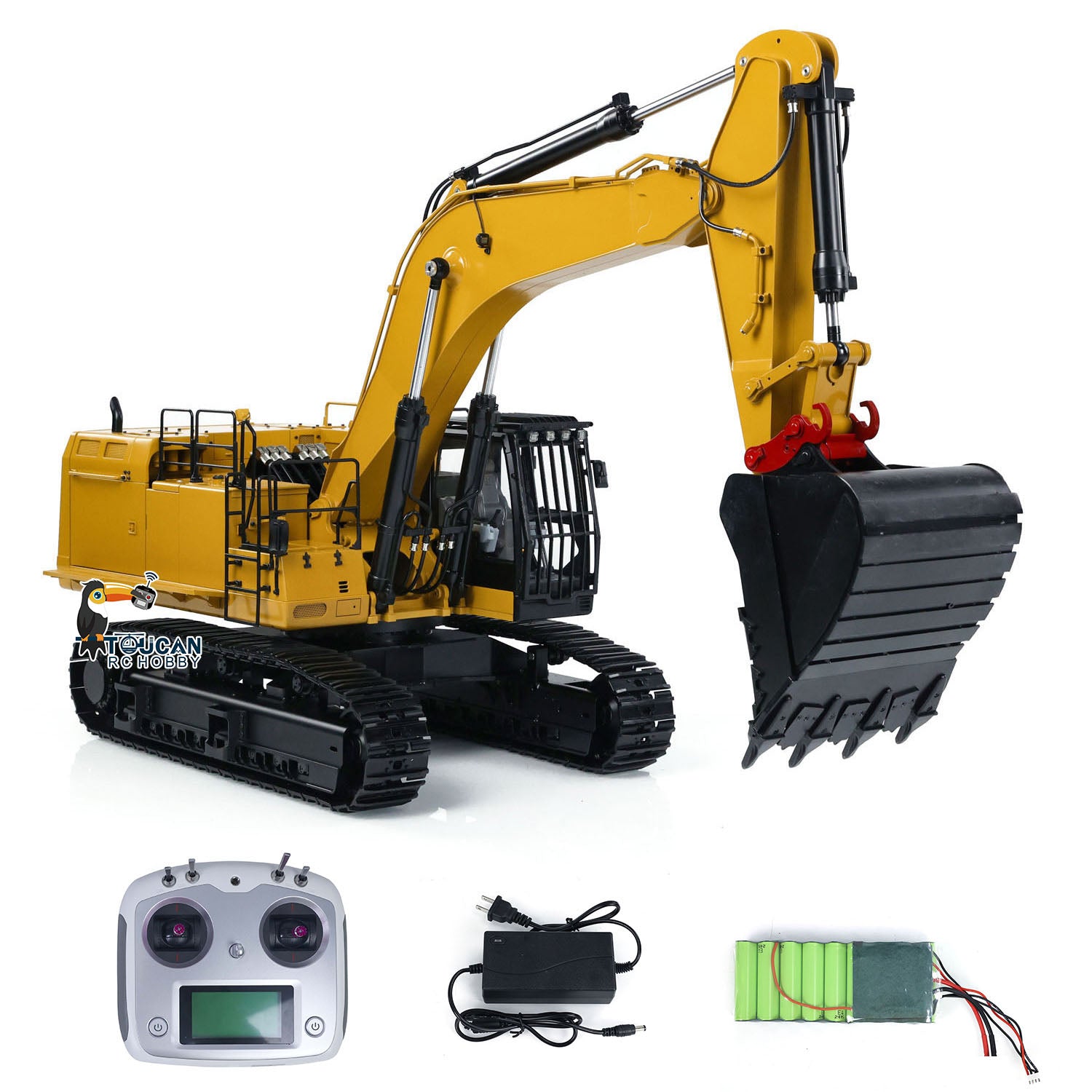How the remote control excavator Reduces Human Error and Boosts Precision
Wiki Article
Recognizing Exactly How Excavator Functions and Its Effect On Performance
Excavators play a necessary duty in building and construction and mining procedures, counting on a complicated interaction of hydraulic and mechanical systems. Their capability to execute a variety of jobs rests on both their style and the modern technology incorporated within. Comprehending these parts can significantly influence operational efficiency and efficiency. As improvements remain to improve the industry, one have to think about how these modifications will certainly influence future practices and performance.The Basics of Excavator Mechanics

The Function of Hydraulic Solutions in Excavators
At the heart of excavator procedure lies the hydraulic system, which plays an essential duty in powering the device's movements and functions. This system makes use of pressurized hydraulic liquid to move power, allowing various activities such as digging, lifting, and moving. By taking advantage of the principles of hydraulics, excavators can carry out jobs with remarkable accuracy and force, enhancing total operational efficiency.The hydraulic system contains vital parts, consisting of cylinders, pumps, and valves, which interact to control the circulation and direction of the fluid. When the operator engages the controls, the hydraulic liquid is guided to details cyndrical tubes, equating the driver's commands right into physical movement. This mechanism permits for receptive and smooth actions, which are crucial in building and excavation environments. double e volvo rc excavator. The efficiency of the hydraulic system directly influences the productivity and versatility of the excavator, making it a vital component in contemporary excavation proceduresKey Components of an Excavator
Understanding the key components of an excavator is essential for realizing just how this powerful device runs. An excavator includes numerous considerable elements, consisting of the undercarriage, house, arm, bucket, and boom. The undercarriage supplies stability and flexibility, typically featuring wheels or tracks to navigate different surfaces. The house has the engine and hydraulic systems, allowing the operator to regulate motion and power the machine. The boom prolongs from your house, enabling vertical reach, while the arm links to the pail, helping with digging and lifting operations.Additionally, the taxi houses the driver, equipped with controls for exact handling. Each of these components plays a crucial role in the excavator's general capability, adding to its efficiency and efficiency on construction sites. Comprehending these components helps in maintaining and maximizing excavator performance, ensuring jobs are finished securely and properly.Attachment Adaptability and Its Benefits
Accessory adaptability is a vital element of excavators, making it possible for operators to change between different devices customized for certain tasks. This adaptability not just enhances job efficiency yet additionally adds to cost-effectiveness by lowering the requirement for numerous equipments. Recognizing the various sorts of add-ons available can greatly affect the total performance and performance of an excavator on job sites.Types of Add-ons
While excavators are largely acknowledged for their digging capacities, their real versatility depends on the broad variety of add-ons readily available. These add-ons improve the excavator's capability, enabling it to execute numerous jobs beyond excavation. Typical accessories consist of containers (for digging and scooping), hydraulic thumbs (for understanding materials), and augers (for piercing openings) Grapples are made use of for managing and moving particles, while rippers can damage up hard surfaces. Various other specialized add-ons, such as trenchers and rakes, allow excavators to adjust to certain task needs. This diversity not just increases the maker's utility throughout different sectors, consisting of building and construction, landscape design, and demolition, however additionally enables operators to customize their devices to meet specific job demands successfully.Boosted Task Efficiency
Making best use of work effectiveness is a key advantage of making use of numerous excavator accessories. explanation Different add-ons permit an excavator to carry out numerous tasks without needing to change tools, saving useful time and labor. Utilizing a hydraulic hammer can damage concrete while a container add-on can dig deep into dirt, allowing a seamless process. This convenience decreases downtime associated with devices changes and boosts productivity on-site. Furthermore, specialized add-ons enhance accuracy in tasks such as grading or landscape design, resulting in higher high quality results. The ability to adapt to numerous task needs not just enhances procedures yet additionally decreases the requirement for added machinery, ensuring that tasks are finished promptly and successfully. Generally, attachment flexibility significantly adds to raised task effectiveness in excavation job.Cost-Effectiveness and Adaptability
Cost-effectiveness is a substantial advantage of utilizing versatile excavator attachments. These attachments enable a single excavator to do several tasks, reducing the need for additional equipment and labor - double e volvo rc excavator. By changing between pails, hammers, and grapples, operators can deal with different jobs, from excavating to demolition, consequently making the most of devices use. This versatility not only lowers functional expenses but also minimizes downtime related to changing equipment. Furthermore, the capability to customize excavators with specialized accessories improves productivity, as they can successfully manage diverse tasks according to task demands. To conclude, the mix of cost-effectiveness and adaptability in excavator attachments adds to boosted operational effectiveness and source allotment in construction and excavation tasks
Advanced Technology in Modern Excavators
Modern excavators are progressively equipped with advanced technology that changes excavation processes. Automation streamlines operations, while boosted fuel efficiency lowers functional expenses. Additionally, clever control systems improve precision and security, noting a considerable development in excavation equipment.Automation in Excavation Processes
As excavation technology advances, automation has emerged as a crucial component in improving efficiency and accuracy on task websites. Modern excavators are outfitted with sophisticated automated systems that promote tasks such as grading, excavating, and trenching with very little driver intervention. These systems make use of sensors, GPS, and equipment learning algorithms to guarantee exact positioning and depth control, considerably reducing the margin for mistake. Furthermore, automation allows operators to concentrate on strategic decision-making instead of hand-operated controls, causing improved efficiency generally. Such developments not only streamline process yet also boost safety and security by reducing human error in intricate operations. The combination of automation in excavation procedures represents a significant advancement in building and construction innovation, driving the sector towards better performance and performance.Boosted Fuel Effectiveness
Innovations in innovation have additionally caused substantial improvements in fuel efficiency for modern excavators. Modern equipments are outfitted with innovative engines that enhance power outcome try this out while minimizing fuel usage. These engines use innovative combustion technologies, such as turbocharging and straight gas shot, to boost efficiency and performance. Furthermore, lightweight materials in building lower general weight, enabling for less power expense during procedure. The introduction of variable rate controls allows drivers to change engine performance according to specific jobs, additionally minimizing gas usage. Because of this, these improvements not just reduced operational expenses however also contribute to ecological sustainability by decreasing discharges. On the whole, boosted fuel performance in excavators is an essential growth that boosts productivity and economic stability in the building industry.Smart Control Equipment
While operators browse increasingly intricate task websites, smart control systems in excavators have arised as important devices for improving performance and precision. These innovative innovations utilize sensors and formulas to check different criteria such as load weight, surface problems, and operational performance. By instantly adjusting hydraulic functions, clever systems optimize maker efficiency, resulting in improved performance and decreased endure components. Additionally, drivers profit from intuitive interfaces that give real-time comments and diagnostics, permitting notified decision-making. This combination of modern technology not only improves procedures but also decreases human error, adding to safer work atmospheres. As the building sector proceeds to evolve, smart control systems will certainly play an important role fit the future of excavator efficiency and effectiveness.Enhancing Operational Effectiveness With Excavators
Excavators play a crucial duty in enhancing operational effectiveness throughout different building and excavation jobs. Their adaptability permits numerous jobs, consisting of excavating, training, and product handling, which simplifies workflows and reduces the need for additional tools. With effective hydraulic systems, excavators can do durable jobs with precision, considerably lowering the moment called for to total jobs. The integration of sophisticated innovation, such as GPS and automated controls, further maximizes their procedure, enabling drivers to attain higher accuracy and lower product waste. In addition, contemporary excavators are created to eat less gas and minimize exhausts, adding to both cost financial savings and ecological sustainability. By using excavators effectively, building and construction groups can enhance performance, satisfy project deadlines, and boost overall website administration. This directory multifunctionality and efficiency make excavators essential tools in the contemporary building and construction landscape.The Future of Excavators in Building and Mining Industries
As the construction and mining markets evolve, the future of excavators is poised for significant makeover driven by technological technology and altering operational needs. Developments in automation and expert system are reshaping excavator capacities, permitting improved accuracy and effectiveness in procedures. Autonomous excavators are arising, reducing the requirement for human treatment and minimizing the danger of accidents.Moreover, the assimilation of telematics and IoT innovation enables real-time tracking of maker efficiency and predictive maintenance, enhancing uptime. Environmentally friendly styles, including electric and hybrid versions, are getting traction, lining up with sustainability goals within the industry.Additionally, using advanced materials and lighter styles enhances fuel effectiveness while keeping efficiency standards. As these trends development, excavators will certainly play an essential duty in meeting the increasing demands for efficiency and security in building and construction and mining, eventually changing functional landscapes.Often Asked Questions
How Do Climate Condition Influence Excavator Efficiency?

Climate condition considerably influence excavator efficiency, as rainfall and mud can hinder grip and stability, while extreme temperatures might impact hydraulic systems. Operators must adapt to these variables to guarantee ideal functionality and safety throughout procedures.
What Precaution Should Operators Adhere To While Utilizing Excavators?
Precaution for excavator drivers include putting on ideal individual protective devices, conducting pre-operation evaluations, ensuring correct interaction with ground workers, maintaining a risk-free range from above risks, and adhering to established functional protocols to prevent accidents.Just How Commonly Should Excavators Be Preserved for Optimal Efficiency?
Excavators need to be maintained consistently to assure peak performance, normally every 250 operating hours or as defined by the maker. Regular checks boost integrity, avoid unforeseen break downs, and expand the lifespan of the devices.
What Is the Ordinary Life-span of an Excavator?
The ordinary life expectancy of an excavator commonly ranges from 10,000 to 15,000 hours of procedure. Aspects affecting long life include maintenance methods, running problems, and the top quality of the machine itself, impacting overall productivity and effectiveness.
Can Excavators Operate on Unequal Surface Effectively?
Excavators can operate efficiently on unequal surface as a result of their articulated designs and adjustable tracks. These features permit them to maintain stability and traction, allowing effective procedure in difficult settings generally encountered in construction and landscape design projects. Each of these components plays an essential function in the excavator's general performance, adding to its performance and effectiveness on building websites. Making best use of task efficiency is a main advantage of using various excavator add-ons. While operators navigate significantly complex job websites, smart control systems in excavators have emerged as essential devices for boosting efficiency and precision. Excavators play a necessary function in enhancing operational effectiveness across various construction and excavation tasks. Developments in automation and synthetic intelligence are improving excavator abilities, allowing for enhanced accuracy and effectiveness in operations.Report this wiki page